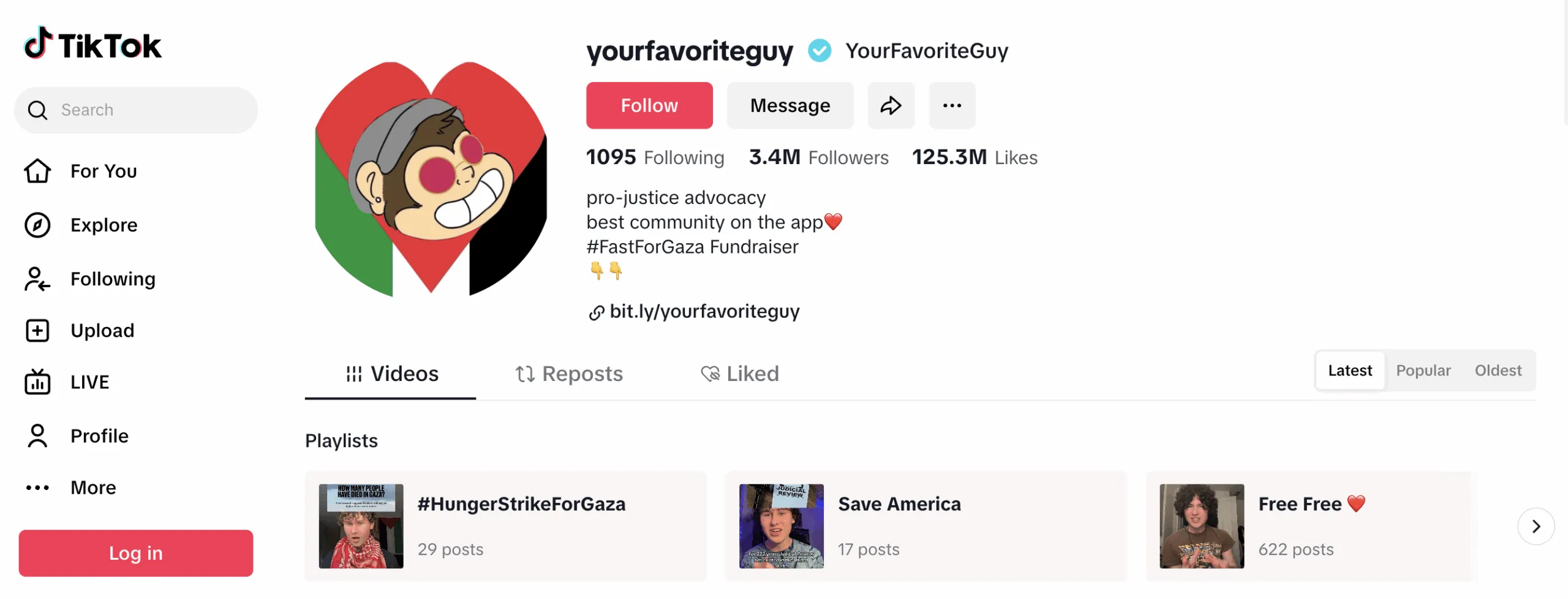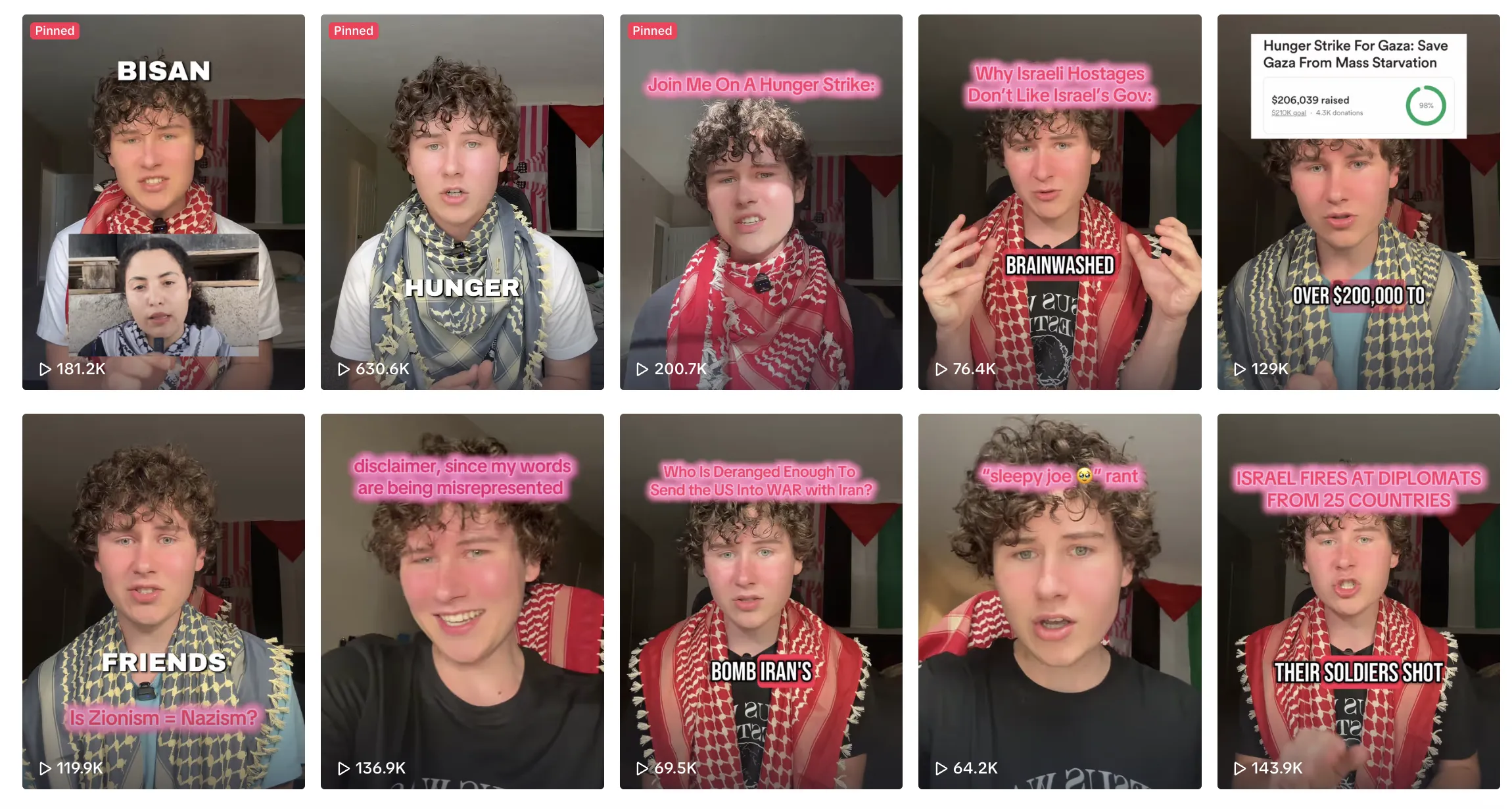RSS
Guy Christensen: The Gen-Z TikTok Star Inciting His 3.4 Million Followers to Murder ‘Zionists’

Yaron Lischinsky and Sarah Lynn Milgrim who were shot and killed as they left an event at the Capital Jewish Museum, pose for a picture at an unknown location, in this handout image released by Embassy of Israel to the US on May 22, 2025. Photo: Embassy of Israel to the USA via X/Handout via REUTERS
You may not have heard of Guy Christensen — but perhaps you should have. Not because he has anything remotely insightful to offer (he doesn’t), but because millions of Gen Z users do hear him, every day.
And understanding Guy Christensen helps explain why so many American college campuses have become incubators for an anti-Israel movement that is less “progressive” than it is unapologetically pro-Islamist.
Born in 2005, Christensen is part of a growing cohort of American influencers who discovered both their political awakening — and their monetizable moment — in the wake of Hamas’ October 7 massacre. Before then, his Instagram resembled that of any ordinary teenager: fishing trips, photos of his girlfriend, the typical adolescent blend of leisure and self-regard.
But like many others, Christensen sensed an opportunity. The fusion of performative compassion for Palestinians and the algorithmic rewards of antisemitism proved irresistible. And so, in May 2025, he posted a video so brazen and grotesque that it achieved precisely what he seemed to desire: outrage, attention, and media coverage.
In the now-deleted post — eventually taken down by TikTok and Instagram — Christensen, who frequently appears on camera draped in a keffiyeh, openly endorsed the murders of Israeli embassy staffers Yaron Lischinsky and Sarah Milgrim. The couple was gunned down outside the Capital Jewish Museum in Washington, D.C., on May 21.

Guy Christensen on Instagram
We are not reproducing the footage. But Christensen’s words are worth documenting — if only to illustrate the depths to which online “activism” has sunk.
“I do not condemn the elimination of the Zionist officials who worked at the Israeli embassy last night,” he declared. He urged his followers to “support Elias’s actions,” referring to Elias Rodriguez, who has since been charged with two counts of murder. “He is not a terrorist. He’s a resistance fighter,” Christensen insisted. “And the fact is that the fight against Israel’s war machine, against their genocide machine, against their criminality, includes their foreign diplomats in this country.”
Rodriguez reportedly told police at the scene: “I did it for Palestine. I did it for Gaza.” After his arrest, he was witnessed chanting “Free Palestine.” Federal prosecutors are treating the attack as an act of terrorism. Rodriguez could face the death penalty. He also said he supported a genocide against white people.
Christensen, meanwhile, may face some type of investigation, with Department of Justice civil rights attorney Leo Terrell stating that he intends to “review all leads.” But the likelihood of real legal consequences remains low. Christensen is a US citizen — and in today’s climate, incitement to murder “Zionists” online exists, as we have seen, in a murky legal gray zone.
The Christensen saga — from teenage TikTok trends to online advocacy for antisemitic violence — is a textbook example of real-time online radicalization. What began as vague, aestheticized “anti-war” rhetoric swiftly mutated into explicit incitement. And millions of young people watched it happen.

In a November 2024 interview with the World Socialist Web Site, which introduced him as a “pro-Palestinian activist” who has “educated many young people [about the] genocide in Gaza,” Christensen explained how it began.
According to him, he already had a large following “prior to October 7th,” when his feed began to fill with “pro-Israel posts about Gaza and Hamas.” He admits: “I knew absolutely nothing about Israel or Palestine.”
“I was seeing all these videos, and I had no idea what they were talking about,” he said. “The idea I got was that Hamas was terrible, that the Palestinians were terrible human beings — and it was a little weird to hear this because it was borderline hateful.”
Then, he says, a pair of comments appeared on his TikTok feed: “Google Nakba” and “Google open air prison.” He did — and, as he puts it, “What I found took me down a path that changed my whole entire life.”
That path, notably, began not with a book, a class, or a conversation — but with two pieces of highly ideological terminology. The first, Nakba — Arabic for “catastrophe” — is the term used to describe the very existence of the State of Israel. The second, “open-air prison,” is an oft-repeated but absurd phrase for a territory that, prior to the current war, saw Hamas leaders living in opulence, amassing enormous wealth, and building a vast arsenal of rockets to fire at Israeli civilians.
As simplistic as Christensen’s radicalization story may seem, it is instructive. It reveals how uninformed young creators can be swept up — and swiftly weaponized — in a digital ecosystem flooded with bot activity, algorithmic amplification, and moral absolutism.
Pro-Palestinian bot networks have been documented spamming platforms like TikTok and Instagram, mass-reporting pro-Israel content while boosting anti-Israel messaging. It’s not far-fetched to suggest that high-follower Gen-Z influencers like Christensen were both targeted and elevated by such manipulation.
The result is that TikTok stars like Christensen are now promoting a worldview that merges antisemitism, anti-Americanism, and political violence — rebranded as “anti-Zionism,” repackaged for a young social media audience, and delivered at viral scale.

Guy Christensen’s TikTok feed
At a minimum, colleges and universities must stop pretending this is merely youthful dissent. If a student openly glorifies murder, why should they be welcomed on campus and rewarded with a degree?
And employers, take note: do you want your brand associated with someone who advocates violence against Jews?
Most urgently, social media companies must be held to account. The murders of Yaron and Sarah are not abstract tragedies. Their deaths are the irreversible consequence of a culture that rewards incendiary content and enables its spread.
Though Instagram and TikTok eventually removed the specific video in which Christensen applauded the killings, the rest of his content — much of it laced with the same veiled incitement — remains online, racking up likes, shares, and impressions.
Since October 7, content like Christensen’s hasn’t merely persisted — it has flourished. His follower count has soared. Bots flood hashtags. Pro-Israel voices are drowned out. And the platforms, far from restraining this trend, continue to profit from it.
It is not enough to remove a single video after the damage is done.
It’s time to stop rewarding hate with reach. It’s time to stop monetizing murder.
The author is a contributor to HonestReporting, a Jerusalem-based media watchdog with a focus on antisemitism and anti-Israel bias — where a version of this article first appeared.
The post Guy Christensen: The Gen-Z TikTok Star Inciting His 3.4 Million Followers to Murder ‘Zionists’ first appeared on Algemeiner.com.
RSS
After False Dawns, Gazans Hope Trump Will Force End to Two-Year-Old War

Palestinians walk past a residential building destroyed in previous Israeli strikes, after Hamas agreed to release hostages and accept some other terms in a US plan to end the war, in Nuseirat, central Gaza Strip October 4, 2025. Photo: REUTERS/Mahmoud Issa
Exhausted Palestinians in Gaza clung to hopes on Saturday that US President Donald Trump would keep up pressure on Israel to end a two-year-old war that has killed tens of thousands and displaced the entire population of more than two million.
Hamas’ declaration that it was ready to hand over hostages and accept some terms of Trump’s plan to end the conflict while calling for more talks on several key issues was greeted with relief in the enclave, where most homes are now in ruins.
“It’s happy news, it saves those who are still alive,” said 32-year-old Saoud Qarneyta, reacting to Hamas’ response and Trump’s intervention. “This is enough. Houses have been damaged, everything has been damaged, what is left? Nothing.”
GAZAN RESIDENT HOPES ‘WE WILL BE DONE WITH WARS’
Ismail Zayda, 40, a father of three, displaced from a suburb in northern Gaza City where Israel launched a full-scale ground operation last month, said: “We want President Trump to keep pushing for an end to the war, if this chance is lost, it means that Gaza City will be destroyed by Israel and we might not survive.
“Enough, two years of bombardment, death and starvation. Enough,” he told Reuters on a social media chat.
“God willing this will be the last war. We will hopefully be done with the wars,” said 59-year-old Ali Ahmad, speaking in one of the tented camps where most Palestinians now live.
“We urge all sides not to backtrack. Every day of delay costs lives in Gaza, it is not just time wasted, lives get wasted too,” said Tamer Al-Burai, a Gaza City businessman displaced with members of his family in central Gaza Strip.
After two previous ceasefires — one near the start of the war and another earlier this year — lasted only a few weeks, he said; “I am very optimistic this time, maybe Trump’s seeking to be remembered as a man of peace, will bring us real peace this time.”
RESIDENT WORRIES THAT NETANYAHU WILL ‘SABOTAGE’ DEAL
Some voiced hopes of returning to their homes, but the Israeli military issued a fresh warning to Gazans on Saturday to stay out of Gaza City, describing it as a “dangerous combat zone.”
Gazans have faced previous false dawns during the past two years, when Trump and others declared at several points during on-off negotiations between Hamas, Israel and Arab and US mediators that a deal was close, only for war to rage on.
“Will it happen? Can we trust Trump? Maybe we trust Trump, but will Netanyahu abide this time? He has always sabotaged everything and continued the war. I hope he ends it now,” said Aya, 31, who was displaced with her family to Deir Al-Balah in the central Gaza Strip.
She added: “Maybe there is a chance the war ends at October 7, two years after it began.”
RSS
Mass Rally in Rome on Fourth Day of Italy’s Pro-Palestinian Protests

A Pro-Palestinian demonstrator waves a Palestinian flag during a national protest for Gaza in Rome, Italy, October 4, 2025. Photo: REUTERS/Claudia Greco
Large crowds assembled in central Rome on Saturday for the fourth straight day of protests in Italy since Israel intercepted an international flotilla trying to deliver aid to Gaza, and detained its activists.
People holding banners and Palestinian flags, chanting “Free Palestine” and other slogans, filed past the Colosseum, taking part in a march that organizers hoped would attract at least 1 million people.
“I’m here with a lot of other friends because I think it is important for us all to mobilize individually,” Francesco Galtieri, a 65-year-old musician from Rome, said. “If we don’t all mobilize, then nothing will change.”
Since Israel started blocking the flotilla late on Wednesday, protests have sprung up across Europe and in other parts of the world, but in Italy they have been a daily occurrence, in multiple cities.
On Friday, unions called a general strike in support of the flotilla, with demonstrations across the country that attracted more than 2 million, according to organizers. The interior ministry estimated attendance at around 400,000.
Italy’s right-wing government has been critical of the protests, with Prime Minister Giorgia Meloni suggesting that people would skip work for Gaza just as an excuse for a longer weekend break.
On Saturday, Meloni blamed protesters for insulting graffiti that appeared on a statue of the late Pope John Paul II outside Rome’s main train station, where Pro-Palestinian groups have been holding a protest picket.
“They say they are taking to the streets for peace, but then they insult the memory of a man who was a true defender and builder of peace. A shameful act committed by people blinded by ideology,” she said in a statement.
Israel launched its Gaza offensive after Hamas terrorists staged a cross border attack on October 7, 2023, killing some 1,200 people and taking 251 people hostage.
RSS
Hamas Says It Agrees to Release All Israeli Hostages Under Trump Gaza Plan

Smoke rises during an Israeli military operation in Gaza City, as seen from the central Gaza Strip, October 2, 2025. Photo: REUTERS/Dawoud Abu Alkas
Hamas said on Friday it had agreed to release all Israeli hostages, alive or dead, under the terms of US President Donald Trump’s Gaza proposal, and signaled readiness to immediately enter mediated negotiations to discuss the details.


